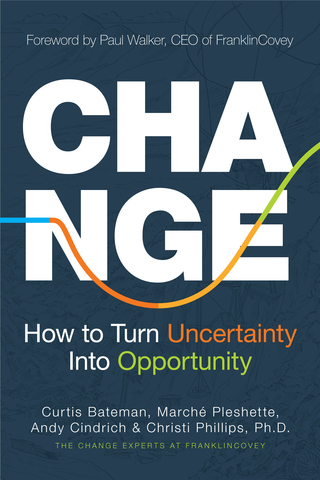FranklinCovey and Mango Publishing Announce the Release of a New Book, CHANGE: How to Turn Uncertainty Into Opportunity, Which is Already a #1 Amazon Bestseller
Timely Book, Helps Leaders Discover How Teams Fall Into Predictable Change Patterns and Reactions and Outlines How They Can Guide Their Teams Through Any Change – Even Disruptive Change

New book is number one Amazon bestseller (Photo: Business Wire)
In the timely book, the authors invite leaders across all industries and organizations to examine their own relationship with change and discover how their teams fall into a set of predictable change patterns and reactions. The book outlines how leaders can safely chart a way forward, to guide teams through any change – even disruptive change.
The book begins with a simple but profound business parable, Who Rocked the Boat?, which focuses on responding to change, using a river journey parable as a point-of-reference. It’s based on timeless principles, timely results, and turning change into individual and collective opportunity. It explores change through the lens of leadership and brings to life these profound principles and practices which can change the trajectory of one’s career, levels of contribution, legacy, or even of an entire organization.
The new book provides readers with a proven framework and concrete examples for navigating change, as well as:
- Step-by-step instructions on how to engage teams throughout the change process.
- The Five Common Reactions to Change and how to adopt and manage them.
- How the Change Model makes change actionable and predictable.
- How to minimize the disruption of change.
- Where most change initiatives fail and how to adapt.
Marché Pleshette, co-author and FranklinCovey Senior Consultant, said, “Change is inevitable. When unexpected or unwanted change disrupts well-established routines, it’s natural to wonder, ‘Who rocked the boat?”’ Unfortunately, that’s the wrong question to ask! Rather, the right question is ‘How do I engage people in change and turn change into opportunity?’ Whatever the size or scope of the change, every leader can be the captain of their change journey and help navigate their people through the waves of uncertainty.”
Reactions to change are fluid, influenced not only by the change itself, but by the culture, team dynamics, community norms, institutional standards, and other considerations. They may be automatic, but learning to adopt and manage these reactions is vital to thriving during change and is a vital leadership competency. Behavior descriptions of The Five Common Reactions to Change include:
- Move - Impulse is to charge quickly into action toward the new objective.
- Minimize - Focuses on what’s expected and tries to change as little as possible.
- Wait - Does nothing immediately. Hesitates for a variety of reasons, waits to see what others do first, and delays until there’s more information or options, or holds back, while prioritizing other things first.
- Resist - Dislikes the change, tries to prevent it, or convinces others to fight it, privately or publicly.
- Quit/Quits – Quit - Stays but gives up and refuses to engage with the change. Quits - Chooses to leave because of the change to pursue something different.
While every change is unique, knowing and understanding these reactions to change is vital for success, just as is following the FranklinCovey Change Model, which functions as a compass and guides leaders through four distinct zones. Leaders will know where they are, what comes next, and how to pilot their team through the rough waters of change. They’ll learn and build the skills which will enable them and their teams to navigate through it all, even when it’s most difficult.
The FranklinCovey Change Model – Four Zones
Zone of Status Quo: preparing your team for change. It’s what we experience before a change happens. We’re in a routine, and it’s business as usual. Even if our routine is busy and stressful, it’s still familiar. It can be difficult leaving the established behind. Those who are most successful at change prepare for it. They’re not content to try and avoid it or simply wait for it to happen. When change appears, whether self-initiated or not, they can better navigate the impending disruption.
Zone of Disruption: clarifying the what, why, and impact of the change. It’s easy to find ourselves in chaos and ambiguity when things you were used to disappear, and what you were used to doing stops working. We can be stuck in this zone unless we clarify the impact of the change. Leaders can fight change insecurity by better communicating and providing information, helping teams to feel more comfortable with and commit to change with greater confidence.
Zone of Adoption: inspiring your team to persist through the change. It’s where most change efforts die, as many may get frustrated or are tempted to give up. Persistence is the key, as well as testing new tactics, learning from failures and setbacks, shifting the approach, and altering thinking. This struggle, as inefficient and painful as it may be, lays the groundwork for future innovation.
Zone of Innovation: inviting your team to explore new possibilities because of the change. New actions feel natural. Having paid the price for innovation, we now leverage the investment for ourselves and our team. We explore new ways of thinking and doing, challenging assumptions, and broadening curiosity. Not all change needs or benefits from the Zone of Innovation, but one of the great benefits of change is taking stock of what could happen now that we’ve experienced new things, overcome significant challenges, and gained a new perspective on what we do.
Implementing FranklinCovey’s course Change: How to Turn Uncertainty Into Opportunity in Organizations: This course teaches individuals, leaders, and organizations to successfully navigate the pattern of workplace change, leading to improved and accelerated results. Consisting of three modules, it can be applied as a stand-alone framework or work alongside any existing change management process. It’s available through the FranklinCovey All Access Pass® in multiple learning modalities.
About the Authors: (NOTE: Schedule an author to deliver an engaging keynote to your team or organization.)
Marché Pleshette is a FranklinCovey Senior Consultant, a skilled leadership coach, and has been a consultant for fifteen years. She has been the subject matter expert for The 7 Habits of Highly Effective People® and serves on FranklinCovey’s consultant coaching team, ensuring the quality of their world-class consultants. She holds a bachelor’s degree in mass communications and is a certified coach through the
About FranklinCovey
FranklinCovey (NYSE: FC) is one of the largest and most trusted leadership companies in the world, with directly owned and licensee partner offices providing professional services in over 160 countries and territories. The Company transforms organizations by partnering with clients to build leaders, teams, and cultures that get breakthrough results through collective action, which leads to a more engaging work experience for their people. Available through the
This approach to leadership and organizational change has been tested and refined by working with tens of thousands of teams and organizations over the past 30 years. Clients have included organizations in the Fortune 100, Fortune 500 and thousands of small and mid-sized businesses, numerous government entities, and educational institutions. To learn more, visit www.franklincovey.com and enjoy exclusive content across FranklinCovey’s social media channels at: LinkedIn, Facebook, Twitter, Instagram, and YouTube.
About
View source version on businesswire.com: https://www.businesswire.com/news/home/20230418005582/en/
Source: FranklinCovey







